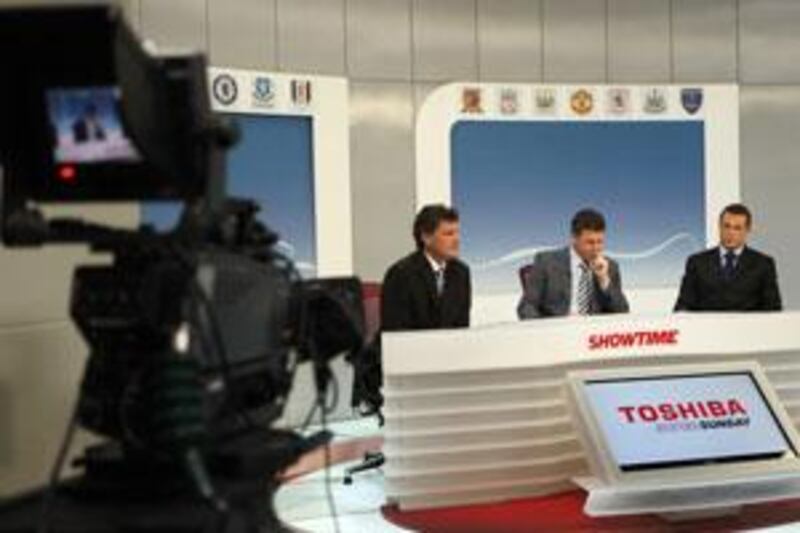ABU DHABI // Showtime Arabia and the Orbit Group have agreed to merge their pay-TV operations to create the Middle East's largest operator. The merger ends 12 years of fierce competition between the two rivals and will give the combined group a broader subscriber base in a region where pay-TV has struggled to take a significant market share away from free-to-air TV. "When such a consolidation takes place, it is a kind of defining moment in terms of TV entertainment," said Marc-Antoine d'Halluin, the chief executive of the new company. "Rather than be confronted by two equivalent choices on the market, consumers will now have a one-stop shop. Simplicity and convenience will create appeal for that segment of the market that has not yet come to pay-TV." Pay-TV has less than 10 per cent penetration in the Middle-Eastern market, analysts say. The announcement came little more than a week after Showtime lost its bid to renew rights to the English Premier League in 2010 to the Abu Dhabi Media Company, which owns The National. Premium football content is generally regarded as a major driver for pay-TV subscriptions globally, but Mr d'Halluin laughed at the notion that the loss had anything to do with the merger. "I can guarantee this has nothing to do [with] losing the Premier League," he said. "We are very definitely hoping to enter into some kind of agreement with the Abu Dhabi Media guys, who we respect a lot. I think the appeal of the [new company] will be even greater to them." The new company is an equal partnership between the Orbit Group, a member of the Riyadh-based Mawarid Group, and Showtime Arabia, a subsidiary of Kuwait Projects Company (KIPCO). Viacom, which previously owned a 20 per cent stake in Showtime Arabia, had been bought out by KIPCO as part of the deal, Mr d'Halluin said. Orbit's non-pay-TV operations are not part of the merger. These include Media Gates, its Arabic production company, Orbit Data Systems, providers of a two-way satellite internet service, and Noorsat, a satellite bandwidth provider. The new company, the name of which is still being decided, will offer more than 70 exclusive channels featuring first-run movies, premium sports, Arabic and international television. New customers may subscribe to new, enhanced packages from Aug 1. Existing Orbit and Showtime subscribers will have the option to sign up for special upgrade offers or retain their subscription packages at their current prices. The new company will keep offices in Dubai, where Showtime is based, and Bahrain, where Orbit broadcasts, and employ about 1,400 staff, according to Mr d'Halluin. "There will probably be an impact on the staff at some point, but that is not the goal of the merger," he said. "The goal is to build the leading media company in the Middle East." Samir Abdulhadi, the president and chief executive of the Orbit Group, said there would be efforts to reduce overlap throughout the operations, from programming to satellite bandwidth to staffing. "The synergies are extremely important in any merger," Mr Abdulhadi said. "At the end of the day, what we want to create is shareholder value and ensure that the workforce is selected in the way that best serves the new company as well as the employees." Nick Grande, the managing director of Channel Sculptor in Dubai, said: "I think that co-operation is what the industry desperately needs, so this is a good bit of news for the industry as a whole, as well as the consumer. "You might not think that merging two big entities like this would be good for consumers, but none of these guys are at a point where they have a critical mass of subscribers, which allows them to pass the benefits back to the consumers. "It's a very capital-intensive industry and if you are not reaching that critical penetration level of the market, you are always having to push the problem on to your customers in terms of pricing." khagey@thenational.ae
Showtime and Orbit form pay-TV giant
The new company will offer over 70 exclusive channels featuring exclusive first-run movies, premium sports, Arabic and international television.

Editor's picks
More from the national




